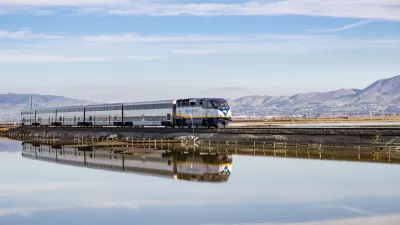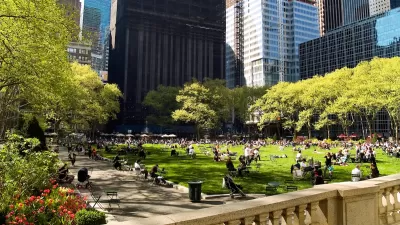With our limits defined, the remainder of what planning is quite powerful. And barely explored.
What is the benefit of planning? What does it do?
My last post was an effort to establish the opposite: what the act of planning doesn’t do. Ironically, much of what I listed are things that we tend to mistakenly label as part of the act. To summarize, the act of planning won’t improve the future, won’t predict the future, won’t unite the city, and won’t solve problems.
If you read that by itself, this list of shortcomings suggests that the act of planning won’t do anything. Worse still, it bears a striking resemblance to the critiques we often get from skeptics. It’s inevitable in any effort. As you develop a plan, a small group of people eventually say that all this work won’t do anything to help anybody anywhere. Most times, this critique comes from the group that feels it is on the “losing side” of some argument.
Such criticisms have frustrated me for a long time. I never feel enough conviction to argue against them. They’re always right when they said “This won’t change anything”. And it’s true. Plans themselves do nothing to directly create change.
The success of every planning effort is hinged upon one thing: a steady procession of smart decisions by the leadership. If you remove the smart, positive decision-making, or change the existing conditions even slightly, all the genius within the plan will likely be irrelevant. This makes any plan a terribly vulnerable thing. So where does this leave us?
Even if a plan—by itself—seems worthless, the act of planning is essential. Don’t take it from me. Consider the words of one of history’s finest planners, Dwight D. Eisenhower: “Plans are worthless, but planning is everything.”
To explore what the President meant by these words, let’s look at what planning will do:
Planning will reinforce goals. We treat goals very strangely. Their real benefit is underrated and their perceived benefit is overrated. We often think that we must “dream big” and have “big goals” in order to rise above the drudgery of everyday life. We see someone struggling, or a business failing, and we think they must lack ambition. If they only had a goal! Then they could crawl out of that slump!
That’s the highly overrated perception. Truth is, goals are like plans: they solve nothing. Their real benefit is much more applied. Goals are the counterbalance to impulsivity; goals are the conscience in your mind sounding the alarm when you do something bad. We all know that eating that cheeseburger is bad for us. But why? Because we have a goal to be healthy and fit.
Goals spark the act of planning. And the act of planning is often what keeps those goals alive. Both are fixated on a better future. You can’t really have one without the other.
Planning will foster simulation. Whether it’s a chess player extrapolating an opponent’s next four moves or a planner generating a full-blown 20-year growth model, the act of planning provides us ways to peer into the future, to simulate what may happen. This is a vital act for all people and organizations. We humans do not enjoy uncertainty. We combat it by thinking of what may lie ahead. The key, of course, is to always be skeptical of our predictions, to never bet too heavy on that proverbial future.
Great simulation takes a special kind of mindset. One must have a good understanding of the dynamics that affect all the different variables within the focus area. Again, whether it’s a fireman planning the way to attack a four-alarm blaze or a MPO determining how to extend a road network, this is all a function of systems thinking. I’m proud to say we do this work better most. At least when it comes to the city. But that skill is transferable and highly prized. Planning can’t predict the future but it can reliably point to the possibilities.
Planning will instill rationality. This is my personal favorite. Planning doesn’t make decisions for us but it does define and judge our options, which is the hallmark of rationality. This works hand-in-glove with simulations. When we simulate the future consequence of a certain option, we can understand why that option is better than another. This is all a product of planning. If there is no planning, there are no options, and there is no real choice. We just take things as they come, becoming reactive, irrational.
That may seem academic but it’s a well-known facet of daily life that reactive behavior is bad. It explains the reasoning behind these strange devices we call “grocery lists”. Why is a grocery list so valuable? Because it tells us what to get at the store? Not really. The deeper value of the grocery list is that it tells you what not to get. The store has thousands of items all begging to be bought and without the grocery list, we are left to our own impulses. If it just so happens that we go to the grocery store hungry, we will act on those impulses and buy things we never wanted (things that conflict with our goals for health and fitness).
Planning applies to everything. If you notice, I’m deliberately keeping the topic of “planning” at a very high level. I’m applying the function to everything from transportation planning to grocery shopping. This is because planning is so very fundamental and so very misunderstood. We misuse the term a great deal. We confuse it with problem-solving, consensus-building, probability, and so much more. We mix techniques and forget what’s important, what’s central.
A great planner is useful not just to cities but to all other industries and facets of life. Great planners who really know what planning is understand how its techniques can be applied in all things.
Finally, planning will create optimism. I mentioned before that planning is our method for coping with uncertainty. Without planning, we have very little reason to be confident. With planning, we can feel certain of how to handle what’s ahead (even when we don’t know what may come). Great planners are almost always optimists. I should hope so, anyway, because there’s never a more optimistic action that one can take: to think about the future (near and far) and how to make it better. This may be the most valuable thing that planning will do for us all.

Maui's Vacation Rental Debate Turns Ugly
Verbal attacks, misinformation campaigns and fistfights plague a high-stakes debate to convert thousands of vacation rentals into long-term housing.

Planetizen Federal Action Tracker
A weekly monitor of how Trump’s orders and actions are impacting planners and planning in America.

In Urban Planning, AI Prompting Could be the New Design Thinking
Creativity has long been key to great urban design. What if we see AI as our new creative partner?

King County Supportive Housing Program Offers Hope for Unhoused Residents
The county is taking a ‘Housing First’ approach that prioritizes getting people into housing, then offering wraparound supportive services.

Researchers Use AI to Get Clearer Picture of US Housing
Analysts are using artificial intelligence to supercharge their research by allowing them to comb through data faster. Though these AI tools can be error prone, they save time and housing researchers are optimistic about the future.

Making Shared Micromobility More Inclusive
Cities and shared mobility system operators can do more to include people with disabilities in planning and operations, per a new report.
Urban Design for Planners 1: Software Tools
This six-course series explores essential urban design concepts using open source software and equips planners with the tools they need to participate fully in the urban design process.
Planning for Universal Design
Learn the tools for implementing Universal Design in planning regulations.
planning NEXT
Appalachian Highlands Housing Partners
Mpact (founded as Rail~Volution)
City of Camden Redevelopment Agency
City of Astoria
City of Portland
City of Laramie






























